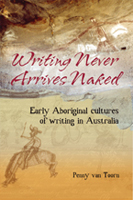Writing Never Arrives Naked: Early Aboriginal cultures of writing in Australia
Summary
In Writing never arrives naked, Penny van Toorn engages our minds and hearts. Her academically innovative book reveals the resourceful and often poignant ways that Indigenous Australians involved themselves in the coloniser’s paper culture. The first Aboriginal readers were children stolen from the clans around Sydney Harbour. The first Aboriginal author was Bennelong — a stolen adult.
From the early years of colonisation, Aboriginal people used writing to negotiate a changing world, to challenge their oppressors, protect country and kin, and occasionally for economic gain. Disrupting conventional beliefs, van Toorn notes that shortly after settlement Aboriginal people were exchanging written texts as curiosities, and integrating letters of the alphabet into their graphic traditions. During the 19th and 20th centuries, Aboriginal people played key roles in translating the Bible, and made their political views known in community and regional newspapers. They also sent numerous letters and petitions to political figures, including Queen Victoria.
Penny van Toorn challenges the established notion that the coloniser’s written culture superseded Indigenous oral cultures. Rather, she argues, Indigenous communities developed their own cultures of reading and writing, which involved a complex interplay between their own social protocols and the practices of literacy introduced by the British.
Penny van Toorn has now retired. She has published widely on the Indigenous Literatures of Australia and Canada, and worked collaboratively with Australian Indigenous authors and academics.
Reviews and endorsements
'This is a finely argued, wide-ranging and really intriguing book. Penny van Toorn looks at a variety of Aboriginal uses of European forms of writing, mainly in the colonial period. She focuses especially on individuals engaged in the writing process and on the precise intent of various parties as they put pen to paper.'
— Alan Atkinson, Journal of Australian Colonial History, Vol. 9, 2007
'This book is an important contribution to debates around the dominant narrative that Marshall McLuhan expressed in the 1960s, that the ‘phonetic alphabet, alone, is the technology that has been the means of creating’ contemporary society (Van Toorn 2006:224).'
— Maryrose Casey, ACRAWSA e-journal, Vol. 3, No. 1, 2007
'The provocative title of Penny van Toorn's writing never arrives naked: Early Aboriginal cultures of writing in Australia piques my reader's attention yet it refers to how writing becomes enveloped in a multilayered, often politically and socially charged, context… Van Toorn closes with such questions and others that could form the impetus for future discussion amongst scholars.'
— Kay Shelton, Sharp News, Vol. 17, No. 2, 2008
